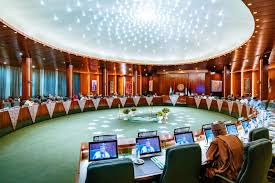The National Economic Council (NEC) on Thursday postponed discussions on the creation of State Police, despite growing insecurity across Nigeria, opting instead to focus on other pressing national matters.
Governor Douye Diri of Bayelsa, speaking to journalists after the meeting chaired by Vice President Kashim Shettima at the State House, Abuja, confirmed that State Police was listed for deliberation but had to be deferred due to time constraints.
“State Police was on our agenda today (Thursday), but because of time demands and lengthy presentations, we couldn’t get to that point. However, I assure you it will be discussed exhaustively in our next meeting in May,” he said.
This comes despite earlier assurances by NEC and individual governors, including Kaduna State’s Uba Sani, that the issue of State Police would be resolved during the April meeting. In February, Governor Sani had stated that all 36 states were in favor of establishing State Police as a response to the worsening security challenges nationwide.
In a related effort to address the security crisis, the Defence Headquarters (DHQ) on Thursday launched a military diplomacy campaign in Adamawa, Katsina, and Anambra States. The initiative aims to engage communities and promote intelligence sharing to aid ongoing military operations. The Chief of Defence Staff (CDS), General Christopher Musa, said the campaign focuses on building trust and preventing youth involvement in criminal activities.
Meanwhile, following a recent meeting with the CDS, state governors renewed calls for increased recruitment into security agencies and greater adoption of technology-driven solutions to tackle insecurity at the sub-national level. Governor Hope Uzodimma of Imo, who briefed journalists on behalf of the Governors’ Forum, said a committee had been set up to work with security agency heads on a joint strategy.
NEC also observed a minute’s silence in memory of victims of recent killings in Benue and Plateau States, which have claimed dozens of lives in recent weeks.
Economic, Livestock Reforms Take Center Stage
Despite the unresolved State Police matter, NEC approved several far-reaching initiatives aimed at economic recovery, job creation, and food security.
Top among them was the establishment of the Cotton, Textile and Garment (CTG) Development Board. The board, to be domiciled in the Presidency and funded through the textile import levy, will be private sector-driven and include representatives from all six geopolitical zones, as well as key federal ministries.
Vice President Shettima said the initiative aligns with President Tinubu’s economic revival agenda, describing it as a move to “resuscitate a sector that once clothed the nation and powered its economy.” Nigeria, he noted, produces only 13,000 metric tons of cotton, far below its potential.
In addition, NEC approved the launch of the Green Imperative Project (GIP) and the establishment of a national office in Abuja and regional offices across the country. This forms part of broader efforts to modernize agribusiness, with projections that the livestock sector alone could generate up to $90 billion in economic value by 2035.
Governor Diri said the Federal Ministry of Livestock Development’s presentation emphasized modern cattle ranching and peacebuilding to curb recurring herder-farmer clashes.
NEC also endorsed the Nigeria Livestock Growth Acceleration Strategy (NL-GAS), which builds on the earlier National Livestock Transformation Plan (2018–2028). The strategy targets transformation of the livestock sector into a source of jobs, revenue, and exports, with investments in animal health, water resources, feed development, statistics, and breed improvement.
The Council resolved to transfer the previously committed N100 billion in livestock development funds to the newly created ministry and encouraged states to establish counterpart ministries and participate actively in the programme.
Skills and Education Drive
The Minister of Education also briefed NEC on efforts to streamline Technical and Vocational Education Training (TVET) nationwide. According to the presentation, the TVET system will deliver standardized, accredited, and modernized skills training across all levels through partnerships with MDAs, states, and the private sector.
The Council endorsed the recommendations and urged states to use the initiative to train youth in digital skills and vocational education, regardless of political affiliations.
Other Strategic Proposals
Governors also received a proposal from the Minister of Housing and Urban Development, Ahmed Musa Dangiwa, on land reform. The proposal seeks to unlock the economic potential of land through federal-state partnerships, enhance land tenure security, and improve revenue generation.
Additionally, the Forum considered a strategic partnership with Powercom Smart Grid Nigeria Limited, which proposes taking over operations of select electricity distribution companies and introducing smart grid technologies. The plan includes establishing a local meter production facility to improve power supply and create jobs.
Governance and Reform Mandate
Addressing the Council, Vice President Shettima stressed the need for governors and federal stakeholders to focus on delivery and reform rather than rhetoric.
“Our citizens are not waiting for another speech. They are waiting for results. This Council must rise above partisan interests and focus on building a nation that works for all,” he said.
He also called for a field visit by the NEC Implementation Monitoring Committee to bridge the gap between policy and performance.
“Governance is not the theatre of promises. It is the solemn business of fulfilment,” Shettima said. “We must always bear in mind that we are not merely responders to crises. We are architects of a sustainable future.”
Edited by Nzubechukwu Eze.









